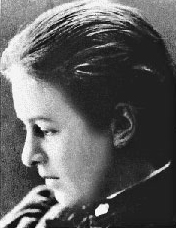Mysticism (book)
| Evelyn Underhill | |
|---|---|
 |
|
| Born |
6 December 1875 Wolverhampton, England |
| Died | 15 June 1941 (aged 65) London, England |
| Occupation | Novelist, writer, mystic |
| Genre | Christian mysticism, spirituality |
| Notable works | Mysticism |
Evelyn Underhill (6 December 1875 – 15 June 1941) was an English Anglo-Catholic writer and pacifist known for her numerous works on religion and spiritual practice, in particular Christian mysticism.
In the English-speaking world, she was one of the most widely read writers on such matters in the first half of the 20th century. No other book of its type—until the appearance in 1946 of Aldous Huxley's The Perennial Philosophy—met with success to match that of her best-known work, Mysticism, published in 1911.
Underhill was born in Wolverhampton. She was a poet and novelist, as well as a pacifist and mystic. An only child, she described her early mystical insights as "abrupt experiences of the peaceful, undifferentiated plane of reality—like the 'still desert' of the mystic—in which there was no multiplicity nor need of explanation". The meaning of these experiences became a lifelong quest and a source of private angst, provoking her to research and write.
Both her father and her husband were writers (on the law), London barristers, and yachtsmen. She and her husband, Hubert Stuart Moore, grew up together and were married on 3 July 1907. The couple had no children. She travelled regularly within Europe, primarily Switzerland, France and Italy, where she pursued her interests in art and Catholicism, visiting numerous churches and monasteries. Neither her husband (a Protestant) nor her parents shared her interest in spiritual matters.
Underhill was called simply "Mrs Moore" by many of her friends, but was not without her detractors. She was a prolific author and published over 30 books either under her maiden name, Underhill, or under the pseudonym "John Cordelier", as was the case for the 1912 book The Spiral Way. Initially an agnostic, she gradually began to acquire an interest in Neoplatonism and from there was increasingly drawn to Catholicism against the objections of her husband, eventually becoming a prominent Anglo-Catholic. Her spiritual mentor from 1921 to 1924 was Baron Friedrich von Hügel, who was appreciative of her writing yet concerned with her focus on mysticism and who encouraged her to adopt a much more view as opposed to the theistic and intellectual one she had previously held. She described him as "the most wonderful personality. ..so saintly, truthful, sane and tolerant" (Cropper, p. 44) and was influenced by him toward more charitable, down-to-earth activities. After his death in 1925, her writings became more focused on the Holy Spirit and she became prominent in the Anglican Church as a lay leader of spiritual retreats, a spiritual director for hundreds of individuals, guest speaker, radio lecturer, and proponent of contemplative prayer.
...
Wikipedia
